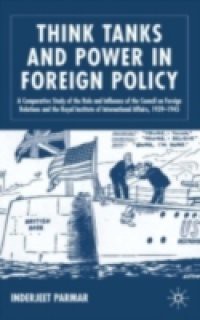What is the role of elites in shaping foreign policy? Did unaccountable foreign policy elites shape the post-1945 world order? As Britain and the United States draw ever closer in global affairs, Think Tanks and Power in Foreign Policy examines the intellectual and political forces that constructed a resilient Anglo-American alliance during WWII. Chatham House and the Council on Foreign Relations were vital in America's shift from isolationism to globalism, and in Britain's shift from Empire to its current pro-American orientation and were also fundamental in engineering public backing for a new world order. This study locates the think tanks within their respective foreign policy establishments and also considers their numerous transatlantic interconnections - social, political and economic. Finally, the historical evidence is tested against important theories of power, including Gramscian, pluralist, corporatist and statist. Inderjeet Parmar presents new evidence to show how well-organized and well-connected elite think tanks helped to change the world.

